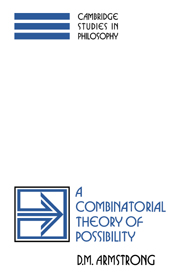Book contents
- Frontmatter
- Contents
- Preface
- PART I NON-NATURALIST THEORIES OF POSSIBILITY
- PART II A COMBINATORIAL AND NATURALIST ACCOUNT OF POSSIBILITY
- 3 Possibility in a simple world
- 4 Expanding and contracting the world
- 5 Relative atoms
- 6 Are there de re incompatibilities and necessities?
- 7 Higher-order entities, negation and causation
- 8 Supervenience
- 9 Mathematics
- 10 Final questions: logic
- Works cited
- Appendix: Tractarian Nominalism, by Brian Skyrms
- Index
- Frontmatter
- Contents
- Preface
- PART I NON-NATURALIST THEORIES OF POSSIBILITY
- PART II A COMBINATORIAL AND NATURALIST ACCOUNT OF POSSIBILITY
- 3 Possibility in a simple world
- 4 Expanding and contracting the world
- 5 Relative atoms
- 6 Are there de re incompatibilities and necessities?
- 7 Higher-order entities, negation and causation
- 8 Supervenience
- 9 Mathematics
- 10 Final questions: logic
- Works cited
- Appendix: Tractarian Nominalism, by Brian Skyrms
- Index
Summary
MATHEMATICAL TRUTH KNOWN A PRIORI, ANALYTIC AND NECESSARY
In this chapter I sketch a view of mathematics which seems to go along harmoniously with a Combinatorialist Naturalism. We may distinguish, in routine manner, between mathematical entities and mathematical truths. The numbers 7, 5 and 12 are mathematical entities. That 7 + 5 = 12 is a mathematical truth. Let us begin with a discussion of the nature of mathematical truth.
The first point I want to make about the truths of mathematics is a traditional one: that mathematical results are arrived at a priori. This is not a very popular position at the present time. I believe that this is because the notion of the a priori carries a theoretical loading derived from past centuries, a loading that is objectionable. But this loading can be removed without great difficulty, leaving a workable concept of the a priori. It is plausible to think that the truths of mathematics are a priori in this purged sense.
The loadings that need to be removed from the notion of the a priori are the notions of certainty (a fortiori, the Cartesian notion of indubitable or incorrigible certainty) and knowledge.
One philosopher who has moved in this direction is Kripke, who said,
Something can be known, or at least rationally believed, a priori, without being quite certain. You've read a proof in the math book; and, though you think it's correct, maybe you've made a mistake. You often do make mistakes of this kind. You've made a computation, perhaps with an error. (1980, p. 39)
- Type
- Chapter
- Information
- A Combinatorial Theory of Possibility , pp. 119 - 137Publisher: Cambridge University PressPrint publication year: 1989

